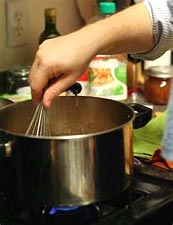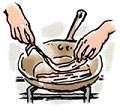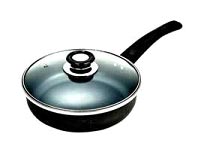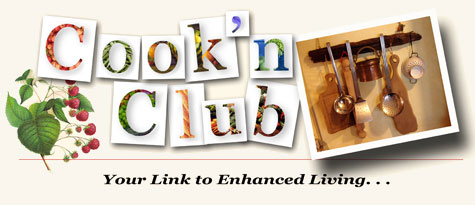Kitchen Mistakes - Things Your Mother Didn't Teach You
By Patty Liston
 As I have mentioned before, my mother was a great cook. She didn't start out that way. She was fond of telling the story of the time she put in 2 cups of rice to cook, thinking that there would be a cup for her and a cup for her new husband. She was shocked when the rice started to rise out of her little pot! It seems her mother never explained rice expansion.
As I have mentioned before, my mother was a great cook. She didn't start out that way. She was fond of telling the story of the time she put in 2 cups of rice to cook, thinking that there would be a cup for her and a cup for her new husband. She was shocked when the rice started to rise out of her little pot! It seems her mother never explained rice expansion.
My mother was a better teacher to me, although I now wish I had paid more attention to her. I still find myself wondering how she got her pie crusts so flakey, or her award winning potato salad so perfect. However, her memory is now gone and the time for questions is past; but that is an article for another time.
Below are some kitchen mistakes we have all made and probably learned the hard way not to ever repeat.
 1. Don't Heat Oil Until it Smokes
1. Don't Heat Oil Until it Smokes
Smoke can become a fire in your pot or pan. According to Eating Well Magazine, most of our recipes begin by having us heat oil in a pan. We then make the mistake of walking away from the stove to do some other prep work. When we do remember the stove, there may already be little tendrils of smoke rising from our oil.
No, this is not an indication that the oil is hot and ready to go. "Not only do many oils taste bad once they have been heated to or past the smoke point," states the article, " but when oils are heated to their smoke point or reheated repeatedly, they start to break down, destroying the oil's beneficial antioxidants and forming harmful compounds."
Depending on the oil you use, the smoke point varies. For instance, olive oil is between 365 degrees to 420 degrees F. If you want to keep your oil from smoking watch your pan and heat until you see the oil shimmer.
Word of caution! NEVER put water into oil that has caught fire. This will cause a fire bomb to go through your home. ALWAYS have baking soda handy to pour on the fire, or place a lid over the pan to smother the flames.
 2. Stirring Your Food Too Much
2. Stirring Your Food Too Much
Oh, I do this more than I care to admit. Stirring too much will prevent the juicy browning many recipes call for. It can also make your food "mushy" and I doubt that we want our creations to look like oatmeal when we are done. Unless the recipe states to "stir often", leave it alone. One or two quick stirs should suffice.
 3. Stuffing Your Pan
3. Stuffing Your Pan
Think of your pan as being like a washing machine: if you stuff your machine with clothes, they will not be able to churn and tumble for maximum cleanliness. This example serves for cooking as well. Stuffing your pots or pans with ingredients will make for uneven cooking, constant stirring to make sure foods are being heated through, and the eventual mush we do not want to serve. When cooking meat, remember that less is more. Cramming meat into a pan will cause the temperature of the pan to lower too quickly, which can cause sticking.
Solution: Cook in smaller batches. You may have a few more pans to wash, but your food will be cooked evenly and maintain its rightful flavor.
 4. Did You Forget to Let Your Meat Rest?
4. Did You Forget to Let Your Meat Rest?
Okay...I almost always forget this part. Really. The family is panting from hunger and what difference does it make anyway? If anyone needs to "rest" it is the cook! So one more time as much for me as for you, dear reader; allowing your meat to rest simply makes it juicer. The next time you cut into your meat too early, just watch all of the natural juices run out and all over your cutting board.
Rule of Thumb: For smaller cuts of meat, resting for 5-10 minutes should suffice. For larger cuts like roasts or turkey, give it 15-20 minutes. You will be amazed at how flavorful your meal will be!
 5. Don't Use Nonstick Pans on High Heat
5. Don't Use Nonstick Pans on High Heat
Most of us have at least a few nonstick pans that we use. But did you know that you need to turn the heat down when using them? I didn't. Evidently the higher temperatures may cause the nonstick lining to release PFC's, (perfluorocarbons) in the form of fumes. These fumes have been linked to liver damage and developmental problems. It is suggested that we check with the manufacturer of our pans to see what temperatures they recommend.

